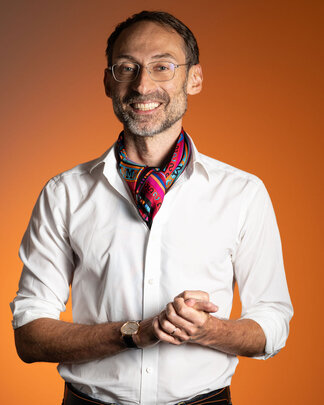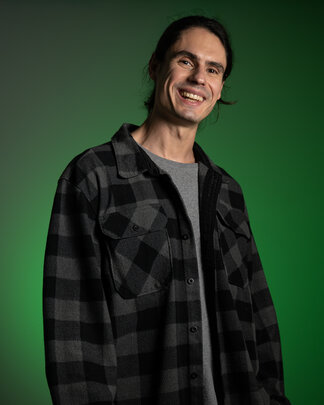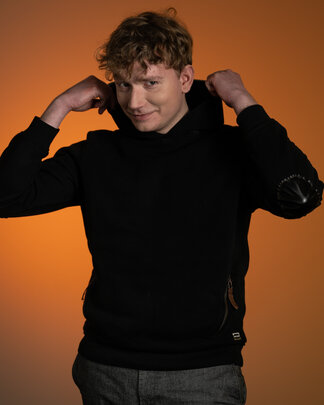Michael Bronstein will bring world-leading expertise in developing novel machine learning technique for biological applications as well as a track record of research commercialization and technological spinoffs and industrial experience.
Michael Bronstein - Scientific Director AI

Michael Bronstein = Make Geometry Great (Again) in ML
Michael Bronstein is the founding Scientific Director of Aithyra, Google DeepMind Professor of AI at the University of Oxford, and Honorary Professor at the TU Vienna and the University of Vienna. He previously served as Head of Graph Learning Research at Twitter and as a professor at Imperial College London, and held visiting appointments at Stanford, MIT, and Harvard.
Michael received his PhD in Computer Science from the Technion in 2007 with a thesis on geometric approaches to pattern recognition, which sparked his admiration for geometry and shaped his scientific worldview. He has developed some of the first geometric deep learning methods and applied them to problems in biochemistry and structural biology, such as protein and small molecule design.
Michael's honours include the EPSRC Turing AI World-Leading Research Fellowship, the Royal Society Wolfson Research Merit Award, and the Royal Academy of Engineering Silver Medal, as well as multiple ERC grants, Google Faculty Research Awards, and Amazon Research Awards. He is a member of Academia Europaea; a Fellow of the IEEE, IAPR, and BCS, an ELLIS Fellow, an ACM Distinguished Speaker, and a World Economic Forum Young Scientist.
Beyond academia, Michael is a serial entrepreneur and founder of several startups, including Novafora, Invision (acquired by Intel in 2012), Videocites, and Fabula AI (acquired by Twitter in 2019). He is Chief Scientist-in-Residence at VantAI and serves on the advisory boards of multiple biotech companies, including Relation Therapeutics and Recursion Pharmaceuticals. When off duty, Michael can often be found on a horse or at the opera theater.
Orchid number: https://orcid.org/0000-0002-1262-252
LinkedIn: https://www.linkedin.com/in/mbronstein
Bluesky: https://bsky.app/profile/mmbronstein.bsky.social
Website: https://www.cs.ox.ac.uk/people/michael.bronstein/
Geometric and Physics-Inspired Machine Learning for Molecular Design
The research of the Bronstein group spans theory, computational methods, and applications. The primary theoretical objective is to understand the behavior and limitations of current machine learning models through the prism of geometry. This informs the computational objective to develop new, efficient, and better-interpretable models (including graph neural networks, equivariant architectures, neural differential equations, and geometric generative models) with performance guarantees derived from their geometric structure, providing predictions that are not just accurate but also physically plausible. Our applications are mainly in AI for science, with a particular focus on problems in biochemistry and structural biology, such as molecular simulations, protein design, and drug discovery. With our life-sciences collaborators, we take the next step in our machine-learning research by testing designed molecules in the wet lab, aiming to uncover new insights into fundamental biology and to help create new medicines.
Publication Highlights
Anthony Marchand, Stephen Buckley, Arne Schneuing, Martin Pacesa, Maddalena Elia, Pablo Gainza, Evgenia Elizarova, Rebecca M Neeser, Pao-Wan Lee, Luc Reymond, Yangyang Miao, Leo Scheller, Sandrine Georgeon, Joseph Schmidt, Philippe Schwaller, Sebastian J Maerkl, Michael Bronstein, Bruno E Correia, Targeting protein–ligand neosurfaces with a generalizable deep learning tool, Nature 639(8054):522—531, 2023.
Arne Schneuing, Charles Harris, Yuanqi Du, Kieran Didi, Arian Jamasb, Ilia Igashov, Weitao Du, Carla Gomes, Tom L Blundell, Pietro Liò, Max Welling, Michael Bronstein, Bruno E Correia, Structure-based drug design with equivariant diffusion models, Nature Computational Science 4(12):899—909, 2024.
Pablo Gainza, Sarah Wehrle, Alexandra Van Hall-Beauvais, Anthony Marchand, Andreas Scheck, Zander Harteveld, Stephen Buckley, Dongchun Ni, Shuguang Tan, Freyr Sverrisson, Casper Goverde, Priscilla Turelli, Charlène Raclot, Alexandra Teslenko, Martin Pacesa, Stéphane Rosset, Sandrine Georgeon, Jane Marsden, Aaron Petruzzella, Kefang Liu, Zepeng Xu, Yan Chai, Pu Han, George F Gao, Elisa Oricchio, Beat Fierz, Didier Trono, Henning Stahlberg, Michael Bronstein, Bruno E Correia, De novo design of protein interactions with learned surface fingerprints, Nature 617(7959):176-184, 2023.
Francesco Di Giovanni, James Rowbottom, Benjamin P. Chamberlain, Thomas Markovich, Michael M. Bronstein, Understanding convolutions on graphs via energies, TMLR 2023.
Michael M Bronstein, Joan Bruna, Taco Cohen, Petar Veličković, Geometric deep learning: Grids, groups, graphs, geodesics, and gauges, arXiv:2104.13478, 2021.


